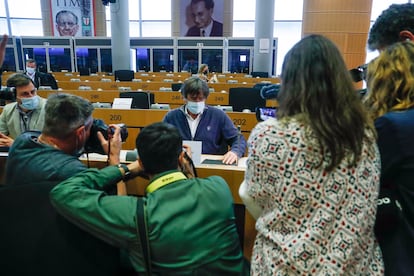Spain’s Supreme Court asks Italy for ‘immediate’ handover of former Catalan premier Carles Puigdemont
The separatist leader was released following a brief arrest and has flown back to Belgium. He has a hearing in Sardinia on October 4, but failure to show up could mean an end to the proceedings

The arrest of former Catalan premier Carles Puigdemont in Sardinia, Italy on September 23 has opened up a new legal avenue for Spain’s Supreme Court, which is seeking his extradition over the role he played during Catalonia’s illegal referendum and unilateral independence declaration of October 2017.
Puigdemont fled Spain with several aides to avoid prosecution over those events, while those who stayed behind, including the then-deputy premier Oriol Junqueras, were tried and sentenced to prison terms for sedition and misuse of public funds. They were pardoned by the Spanish government earlier this year.
Puigdemont has been living in Belgium since late 2017, but attempts by the Spanish courts to get him extradited to Spain to face criminal charges have come up against the Belgian justice system, which has so far failed to execute European arrest warrants against him and other independence leaders who settled down in that country. He was also briefly arrested and released in Germany in 2018.
A day after his arrest on the island of Sardinia, where he was attending a folk festival, Puigdemont was let go by an Italian court while judges consider whether the European arrest warrant against him is valid and whether he currently enjoys immunity as a Member of the European Parliament (MEP), which he joined following the European elections of 2019. In March of this year, this body voted to lift his immunity, and in July the General Court of the European Union rejected Puigdemont’s request for an injunction against the suspension of his immunity while the court considers his appeal.

Puigdemont’s arrest last month created a very uncomfortable situation in Italy, where the executive found out about it through the media. Italian Prime Minister Mario Draghi said on Wednesday that he has not been in touch with the Spanish government over the issue.
It also came at a delicate time in Spain, where Prime Minister Pedro Sánchez of the Socialist Party (PSOE) had just restarted negotiations with the Catalan government over the future of the region.
Judge Pablo Llarena of Spain’s Supreme Court, who has been handling the case against leaders of the 2017 secession bid, on Thursday sent a request to the appeals court in Sassari for the “immediate” transfer of Puigdemont to Spain. Llarena stated that the European arrest warrant against the Catalan separatist leader remains valid despite the fact that the Spanish Solicitor General’s Office had earlier said it was not – an assertion that influenced the European court’s decision to deny Puigdemont’s request to have his immunity temporarily restored, as there was no perceived risk of detention.
The court in Sassari will have to assess the arrest warrant from Spain, but the normal thing would be for the court to let Puigdemont leave the country until then and give him another hearing dateSource familiar with case
The separatist leader left Italy on September 27 following his brief arrest and was seen at the European Parliament in Brussels that same afternoon. He told reporters that he is planning to fly back to Italy on October 4 for a scheduled hearing before the Sassari Appeals Court, which will start considering whether to act on the arrest warrant.
Judge Llarena is primarily asking Italy to hand over Puigdemont. But in the event that the European courts should restore his immunity as a precautionary measure, he is also asking Italian judges not to drop the proceedings but to suspend them instead, and to take steps to ensure that Puigdemont could still be extradited at a future time – through regular court appearances in Italy, for instance.
“The court in Sassari will have to assess the arrest warrant from Spain, but the normal thing would be for [the court] to let Puigdemont leave the country until then and give him another hearing date,” said a source familiar with the case.
According to the Italian justice system, however, if Puigdemont should fail to show up on October 4, the proceedings would be dropped entirely since the arrest warrant is not applicable to someone who is outside the territory. Sources familiar with the situation said it would not make sense for Spain to keep requesting his extradition from Italy, and that in these cases the accused parties typically do not show up for the hearings.
Meanwhile, the General Court of the EU still has to consider the appeals filed by Puigdemont and by fellow MEPs Toni Comín and Clara Ponsatí – former members of his Cabinet who fled to Belgium with him – against the lifting of their parliamentary immunity earlier this year. This kind of case can take up to 17 months to get resolved, according to legal experts.
English version by Susana Urra.
Tu suscripción se está usando en otro dispositivo
¿Quieres añadir otro usuario a tu suscripción?
Si continúas leyendo en este dispositivo, no se podrá leer en el otro.
FlechaTu suscripción se está usando en otro dispositivo y solo puedes acceder a EL PAÍS desde un dispositivo a la vez.
Si quieres compartir tu cuenta, cambia tu suscripción a la modalidad Premium, así podrás añadir otro usuario. Cada uno accederá con su propia cuenta de email, lo que os permitirá personalizar vuestra experiencia en EL PAÍS.
¿Tienes una suscripción de empresa? Accede aquí para contratar más cuentas.
En el caso de no saber quién está usando tu cuenta, te recomendamos cambiar tu contraseña aquí.
Si decides continuar compartiendo tu cuenta, este mensaje se mostrará en tu dispositivo y en el de la otra persona que está usando tu cuenta de forma indefinida, afectando a tu experiencia de lectura. Puedes consultar aquí los términos y condiciones de la suscripción digital.








































